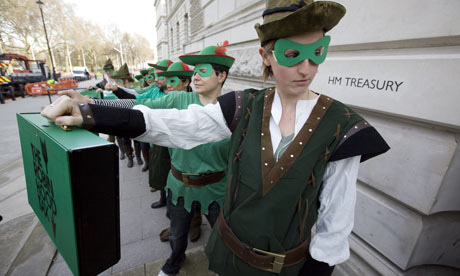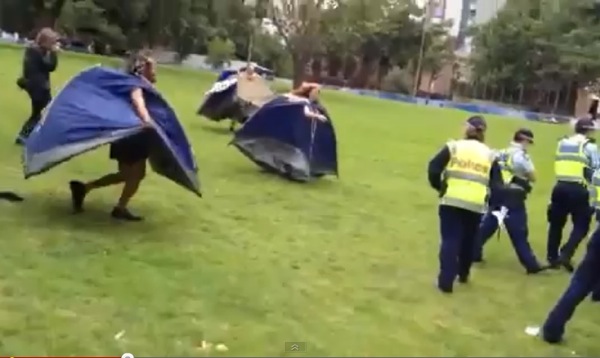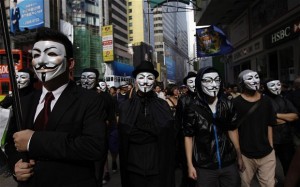Occupy Movement puts Theatre Activism in the spotlight!
Occupy Wall Street has put theatre activism into the spotlight like never before. Conceptualized by Vancouver-based Adbusters Magazine, the Occupy Movement kicked off on September 17 by taking over New York City’s Zuccotti Park, near Wall Street in Manhattan. The initial encampment consisted of a small tent-city, including everything from kitchens to libraries to performances spaces for theatrical and democratic expression. Daily expressions of anger and outrage were directed at Wall Street bankers, economic injustice and corruption, and a system that favouritizes the richest 1% at the expense of the other 99%. As the outrage magnified through social networks first, and traditional media outlets later, the protest went viral and over 900 other Occupy camps appeared in various cities across the world.

Unlike many of the more conventional movements of the past, Occupy is unique in several distinct ways. It is leaderless, democratic, highly inclusive (with the central slogan being “We are the 99%”), community-building, DIY (do-it-yourself), it targets corporate oppression and it has staying power. It is also extremely theatrical.
Indeed, the central symbol of the movement is a mask; the infamous V-for-Vendetta mask signifies “Anonymous“, an anti-oppressive Everyperson, whose computerized voice frequently expresses solidarity with activists and encourages their important work.
Born in this Occupy movement are several new techniques that fall into the category of theatre activism, or the use of drama and theatricality for activist purposes, such as awareness-raising or direct intervention. Here’s a list of some of the latest theatrical innovations to come from the Occupy Movement, as well as some dramatic strategies for the future.
MIC CHECK: This voice projection technique was allegedly created after megaphones and other projection equipment were prohibited at Zuccotti Park. To project the voice, a speaker announces “mic check”, which is repeated by the crowd, then proceeds to relay a message in sentences, which the crowd repeats it in unison and at a high volume, in order for everyone to hear. The mic check technique has since moved on to corporate locations where it has been used by activists to challenge corporatist discourse and help unionization drives at places like Walmart.
ROBIN HOOD TAX: Occupy protesters have been demanding a “Robin Hood Tax” on speculative corporate transactions – $1.3-trillion that’s sloshing around the global casino each day – to “fund every social program and environmental initiative in the world”. To theatricalize the message, roving bands of actors dressed as Robin Hood have been taking the message to financial districts around the planet.

TENT MONSTERS: One of the central reasons encampments of the Occupy Movement have been consistently attacked by police forces across the globe is because they allegedly broke anti-camping by-laws and other ordinances against staying in parks overnight. Politicians across the world have tended to agree that activists may express themselves so long as they do not occupy space, viscerally challenging the core message of the movement by invoking insignificant by-laws. In Melbourne, Australia, Occupiers created an ingenious “tent monsters” plan, a scheme that transformed tents into costumes and a playful performance that left the police outwitted.

HUMAN RED CARPET: This holiday season, several dozen Occupy DC protesters rolled out the human red carpet for the U.S. Chamber of Commerce’s holiday party at their Washington, DC headquarters. The Chamber is the nation’s largest corporate lobby group. As guests entered, protesters shouted, “You walk on our rights, now walk on us!” encouraging attendees to trample on the activists laying underneath the red carpet painted with “99%.” A man dressed in business attire encouraged the participants to walk all over the people, suggesting they do so on a regular basis.

BANK THEATRE: Activists have re-appropriated Danger Tape and created “Occupy Tape” and “Foreclosure Tape”, then went about, playing anti-corporate ninjas, and “foreclosing” banks as theatrical gestures of culture-jamming. Meanwhile, in London, England, Occupiers actually managed to occupy a real bank by citing the UK’s liberal squatting laws, and created The Bank of Ideas as an anti-corporate community space from the failed UBS banking enterprise.

Here are some further suggestions to continue facilitating theatre activism and the human right to Freedom of Expression within the Occupy movement and beyond:
SPEAKER’S CORNER: One good way to ensure police cannot harass or molest protesters is to install a Speaker’s Corner, preferably a permanent one with the blessing of city officials. In Montreal, where Occupiers took over Square Victoria until evicted by police, McGill University Professor John Gradwell has intensified calls for a permanent Speaker’s Corner. While Montreal Cultre Minister Helen Fotopulos has been promising one for years (since the beginning of the Iraq war, in fact), there has been no action despite recent announcements that a Speaker’s Corner would be opened on Mount Royal, at the Gazebo, to honour author Mordecai Richler. Inexplicably, when Occupy protesters showed up to try and use the area to express themselves, they were evicted yet again by the police. Is the Culture Minister merely paying lip service to a permanent Montreal Speaker’s Corner? Ask her – Helen Fotopulos can be reached at hfoto@videotron.ca.
INFRINGEMENT FESTIVAL: The infringement festival draws together like-minded artists and activists for creative performances and events that challenge the oppressive status quo, all in a community setting that is free from corporate interference. Originally designed to protest the corporate takeover of the Fringe Festival (the words “fringe” and “fringe festival” were actually trademarked in Toronto in 1998), the infringement festival now exists as a tool to empower artists and communities in several cities such as Montreal, Buffalo, Brooklyn, and Hamilton.

Given that the Fringe Festival has been excluding and censoring artists who object to their questionable financial policies, the infringement festival offers a much-needed antidote and alternative to this glaring corporate takeover of activist culture and arts. For information on empowering your community by starting your own infringement festival, see the help guide book. For those in Montreal, the 2012 infringement festival will run June 14 – 24, and organizing meetings will be held at 7pm every Wednesday in 2012, at L’Escalier, starting January 11th. Artists and activists are all welcome!
With the Occupy Movement in its infancy, acts of cultural resistance will continue to develop and pioneering strategies of theatre activism are bound to emerge. These are very exciting times for activism – and theatre!

